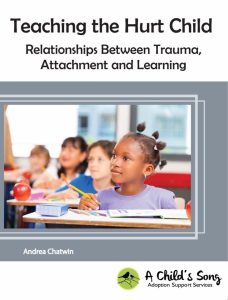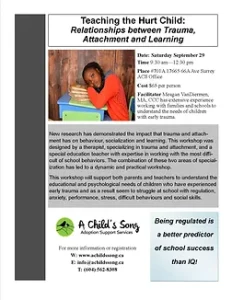

For those of us parenting children with a history of trauma and loss, back to school can be a stressful time of year. We worry about how our child will cope with the changes and challenges this time of year represents and try our best to communicate effectively with teachers about what they need to be successful. If you are feeling a bit unsure as to how you might approach your child’s teacher about your concerns here are some things to consider.
Children’s bodies react in many different ways when the demands they encounter overwhelm their coping resources. There is no specific amount of coping capacity that a child SHOULD have, this is individual to the child and dependent on personality, history and current supports. It can also fluctuate dramatically from day to day or month to month.
Very young children thrive in moderately stimulating, low stress environments that allow for close proximity to a primary attachment figure. Children who have lived through the trauma of loss and fear will need to experience this type of environment longer than their typically developing peers and yet don’t get this opportunity because they need to be in school. For our kids, the classroom is often an overstimulating environment with multiple stressors in which children are expected to cope independently from their primary source of soothing (parent).
Feeling safe both physically and psychologically and experiencing success are fundamental to a child’s ability to tolerate the expectations and demands of school. It’s our job as adoptive and foster parents to carefully monitor how safe and how successful our child is feeling much like we would with younger children. Too much shame reinforces negative beliefs about self and others while no experiences of shame at all deprives a child of important awareness of how his or her behavior impacts those around them. When a child’s capacity to tolerate incoming messages of shame or disapproval is overwhelmed it will quickly become evident in their behavior, relational responses and ability to absorb new information and new experiences. It will also start to impact important areas of functioning and development.
The first step to managing your child’s stress is to have a clear understanding of their baseline functioning. What does it look like when they are most regulated? How do they sleep, eat, engage in family relationships, demonstrate secure attachment responses to a primary caregiver(s), experience joy and appear receptive to new experiences and ideas. Summertime offers children a much needed break from the demands of school and activities that create a fast paced existence with limited opportunity for self direction and spontaneous experiences. Most children return to baseline functioning at some point in the summer which offers parents an idea of what it looks like when their child is better regulated.
It is our job as parents to ensure that our children do not shift to far from baseline as they begin to encounter the expectations and demands of school. When we do see this happening we need to carefully calculate the psychological risks and find ways to effectively reduce their stress and match expectations with their current capabilities.
Here are a few important discussion points to have with your child’s teacher at the beginning of the year to ensure that they understand the importance of monitoring your child’s stress.
1. As his parent(s) I am committed to my child’s emotional and psychological well being and consider this to be more of a priority than his education. This means that I’m comfortable with him not achieving everything recommended for his grade level if doing so interferes with his mental health. We are open to supplementing his learning at home when necessary.
2. This is what my child’s baseline looks like when he is mostly regulated and this is what you can expect to see if he shifts too far away from it. Be specific in naming the signs of regulation and dysregulation you have observed in your child. For example: ‘When my child is regulated he will offer some eye contact when you speak to him, particularly if you gently remind him. Once he is escalated you can no longer engage him in any eye contact. ‘
3. You may not see the same behaviors or responses to stress during the day that we see when our daughter comes home. She might try really hard to manage expectations at school to avoid embarrassment. By the time she arrives home she will have has used up all her coping resources and be highly dysregulated. This is common for children with a history of trauma and loss. Please trust our judgement if we decide to pull back and reduce daytime expectations so that our child can save some of her resources for the evening time.
4. One of the things that will consistently shift my child’s baseline functioning is if she experiences shame too frequently or too intensely. We would like to minimize the amount of negative feedback she gets at school when she is unable to regulate herself. If her behavior requires more than gentle redirection or reminders we would like to know about this right away. We will make ourselves available to support you in getting her back on track.
5. Our child’s functioning is likely to fluctuate throughout the year. You might notice this in the way he learns, what he remembers, his attention span, ability to follow directions, etc. This can be frustrating but is a normal part of the healing process for children who have had early fear based experiences. There will be times of the year when his body remembers feeling very sad or scared and he will be working hard to manage these feelings. Other times it will just seem like he is have a day or a week where he is not able to function at the same level as he usually can. Please understand that this is not willful non compliance or laziness.
A Child’s Song is committed to providing parents and educators with the tools they need to help children experience success in the classroom. Here are a few of our current resources:

1. Teaching the Hurt Child Manual is based on the content of a workshop that A Child’s Song has been presenting across the province for many years. The concepts in this manual came from the experiences of our therapists who participate in school based meetings for children struggling to be successful. The turning point for any school in meeting the needs of a child with early trauma is the understanding of important concepts relatedtobrain development, trauma, loss and attachment.
We know that a child’s early experiences not only impact the way the brain is formed but also shape beliefs about self and others, essentially forming the child’s worldview. With the foundational information offered in this manual, it is easy to see why the current way of responding and managing these behaviors isn’t working and that new interventions are essential. Manuals are available for purchase on our Home page.
2. Attachment Printable for Teachers
This resource is a printable designed for your child’s teacher to understand the basics of how attachment can be supported by their responses to a child’s needs. You can find a copy of this printable attached to a previous blog post 5 Things Your Child’s Teacher Needs to Know about Attachment.
3. Teaching the Hurt Child Workshop will be offered in Surrey, BC on September 29 from 9:30 am- 12:30 pm. More information about this workshop and how to register can be found at Fall 2018 Workshops.This workshop can also be requested for school professional development days.
4. Parent Consultations are offered to parents that wish to discuss the concerns they have about their child’s adjustment and functioning at school. Our therapists are trained to understand how early trauma and attachment losses impact a child’s ability to function behavioral and academically at school. We support parents and school professionals in designing a school based intervention plan for children who have been adopted or are in foster care. You can email us to set up an appointment.
5. Safe and Sound Protocol (SSP) is a 5 day listening intervention designed by Dr. Porges and offered at the A Child’s Song clinic to support improved attention and regulation. Learn more about this specialized intervention on the HOME page.
For any other information about our services please feel free to contact us by email or by phone (604) 562-8308.